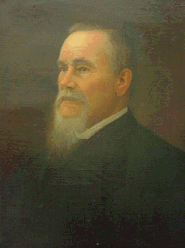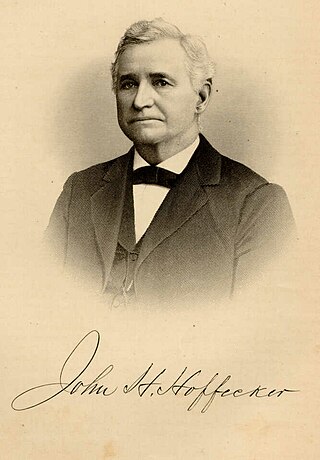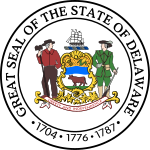
Ebe Walter Tunnell was an American merchant and politician from Lewes, in Sussex County, Delaware. He was a member of the Democratic Party, who served in the Delaware General Assembly and as Governor of Delaware.

James Frank Allee was an American merchant and politician from Dover, in Kent County, Delaware. He was a member of the Republican Party who served in the Delaware General Assembly and as U.S. Senator from Delaware. He was known by his middle name.

Joshua Hopkins Marvil was an American merchant and politician from Laurel, in Sussex County, Delaware. He was a member of the Republican Party, who served as Governor of Delaware.

William Tharp Watson was an American banker and politician from Milford, in Kent County, Delaware. He was a member of the Democratic Party, who served in the Delaware General Assembly and as Governor of Delaware.

John Henry Hoffecker was an American engineer and politician from Smyrna in Kent County, Delaware. He was a member of the Republican Party, who served as U.S. Representative from Delaware.

The 1896 South Carolina gubernatorial election was held on November 3, 1896 to select the governor of the state of South Carolina. William Haselden Ellerbe won the Democratic primary and easily won the general election to become the 86th governor of South Carolina.

The Republican State Committee of Delaware is the affiliate of the United States Republican Party in Delaware. It has regional offices in Dover, Newark, North Wilmington, and Georgetown.

The 1960 Delaware gubernatorial election was held on November 8, 1960.

The 1886 Delaware gubernatorial election was held on November 2, 1886. Incumbent Democratic Governor Charles C. Stockley was barred from seeing a second consecutive term in office. Former Congressman Benjamin T. Biggs won the Democratic nomination to succeed Stockley. The Republican Party, which was weak and practically nonexistent in the state at the time, did not run a candidate for Governor. As a result, the Temperance Reform Party briefly supplanted the Republican Party as the primary opposition to the Democratic Party. Former State Representative and Smyrna Town Treasurer John H. Hoffecker, a former Democrat, emerged as the Temperance Reform nominee. However, the Democratic Party remained strong in the state; with no Republican opponent and only weak opposition, Biggs won in a landslide.

The 1900 Delaware gubernatorial election was held on November 6, 1900. Though Governor Ebe W. Tunnell was eligible for re-election under the newly adopted 1897 constitution, the state convention ended up nominating Peter J. Ford, a prominent businessman.

The 1904 Delaware gubernatorial election was held on November 8, 1904. Though incumbent Republican Governor John Hunn was eligible to run for re-election, he declined to do so. Instead, as the intra-party battle in the Republican Party between the Addicks and anti-Addicks factions continued, Hunn stepped aside to avoid additional conflict. The Addicks, or Union Republicans, nominated Henry C. Conrad for Governor, while the anti-Addicks, or Regular Republicans, held out with their own ticket and nominated Joseph H. Chandler for Governor. On October 12, 1904, the two factions united and agreed to jointly nominate industrialist Preston Lea, a favorite of the Regular Republicans.

The 1908 Delaware gubernatorial election was held on November 3, 1908. Though some Republicans had interest in nominating incumbent Governor Preston Lea to a second term, the state convention instead named former State Senator Simeon S. Pennewill as the Republican nominee. In the general election, Pennewill faced Democratic nominee Rowland G. Paynter, a physician. Pennewill ultimately defeated Paynter by a relatively slim margin, continuing the Republican streak in Delaware gubernatorial elections.

The 1912 Delaware gubernatorial election was held on November 5, 1912. Though Republican Governor Simeon S. Pennewill was eligible for re-election, State Senator Charles R. Miller was nominated by the state Republican convention. With the nationwide rise of the Progressive Party, Delaware Republicans were keen to not lose the race due to a strong showing by a Progressive candidate; Miller was seen as amenable to all factions of the Republican Party and to Progressives. In the general election, Miller faced Democratic nominee Thomas M. Monaghan, who had been elected as State Senate President in a majority-Republican chamber as the result of a coalition agreement with Progressives, and Progressive nominee George B. Hynson.

The 1916 Delaware gubernatorial election was held on November 7, 1916. Incumbent Republican Governor Charles R. Miller declined to run for re-election. At the time, the Republican Party was in the middle of a schism that had first developed during the 1912 presidential election. However, the schism did not affect the gubernatorial nomination; though there were rumors that the state party convention might seek to nominate Governor Miller for a second term, former State Representative John G. Townsend Jr. was seen as the frontrunner heading into the convention. He received the nomination without much difficulty and the Republican Party solidified around him its gubernatorial nominee. The Democratic Party nominated former Secretary of State James H. Hughes, and both Townsend and Hughes advanced to the general election.

The 1920 Delaware gubernatorial election was held on November 2, 1920. Incumbent Republican Governor John G. Townsend Jr. declined to seek re-election. At the Republican convention, former State Representative William D. Denney, the frontrunner for the nomination, received the Party's endorsement for Governor without difficulty—though some opposition to his candidacy arose before the convention.

The 1924 Delaware gubernatorial election was held on November 4, 1924. Republican Governor William D. Denney declined to seek re-election, and the Republican state convention unanimously named banker Robert P. Robinson as its nominee; Robinson emerged as a compromise selection.

The 1928 Delaware gubernatorial election was held on November 6, 1928. Republican Governor Robert P. Robinson declined to seek a second term so C. Douglass Buck, the Chief Engineer of the State Highway Department, was seen as the likely frontrunner heading into the Republican convention. At the convention, Buck's primary opponent was State Senator I. Dolphus Short, whom he defeated by a wide margin, receiving 104 votes to Short's 54.

The 1936 Delaware gubernatorial election was held on November 3, 1936. Incumbent Republican Governor C. Douglass Buck was barred from seeking re-election to a third term, creating an open race. A challenging contest developed on the Republican side to succeed Buck, with Harry L. Cannon, former State Senator I. Dolphus Short and Assistant Motor Vehicle Commissioner George S. Williams all emerging as frontrunners. Cannon, a longtime figure in state politics who served as a member of the State Board of Agriculture and on the University of Delaware Board of Trustees, ultimately won the nomination. Short walked out of the convention, however, and shortly thereafter organized a slate of statewide candidates as Independent Republicans, dividing the party.

The 1940 Delaware gubernatorial election was held on November 5, 1940. Incumbent Democratic Governor Richard McMullen originally ran for re-election to a second term, and was renominated by the Democratic Party. However, less than a month before the election, McMullen suffered a heart attack and he dropped out of the race. The state party named Secretary of State Josiah Marvel Jr., as McMullen's replacement on the ballot. On the Republican side, Wilmington Mayor Walter W. Bacon was nominated by the Republican Party for Governor.

Joseph Laws Cahall was an American lawyer and politician who served as the Secretary of State of Delaware from 1905 to 1909. He was a Republican.













